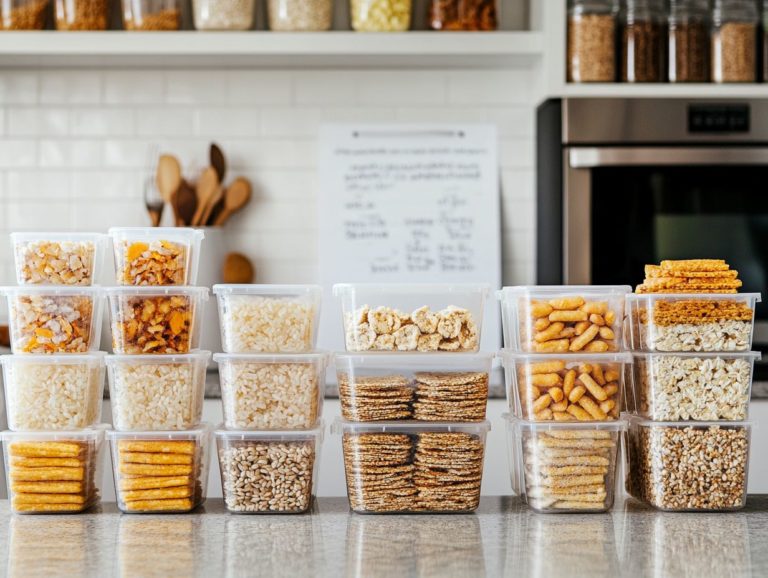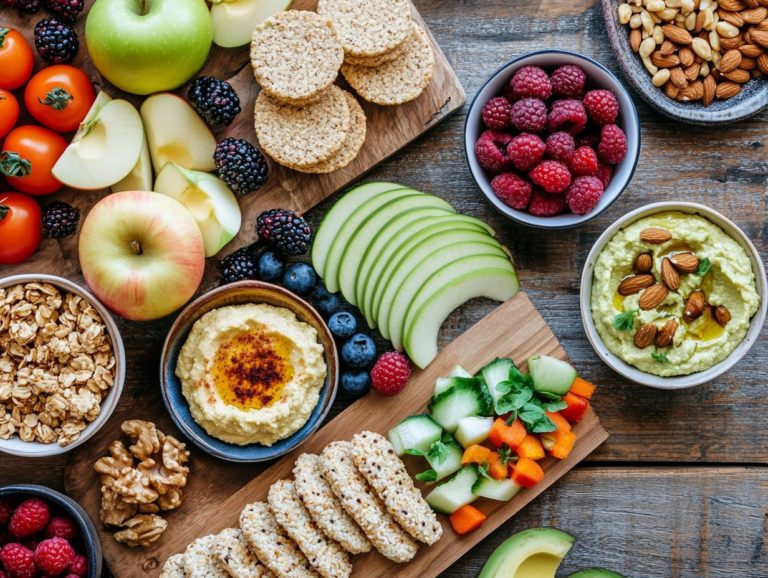Can I Eat Potato Chips on a Gluten-Free Diet?
Contents
- Are Potato Chips Gluten-Free?
- Key Takeaways:
- What Is a Gluten-Free Diet?
- Are Potato Chips Gluten-Free?
- What Ingredients Should I Look Out for in Potato Chips?
- What Are the Alternatives to Regular Potato Chips on a Gluten-Free Diet?
- Can I Eat Potato Chips on a Gluten-Free Diet in Moderation?
- What Are the Risks of Eating Potato Chips on a Gluten-Free Diet?
- How Can I Make My Own Gluten-Free Potato Chips at Home?
- Frequently Asked Questions
Are Potato Chips Gluten-Free?
Navigating a gluten-free diet can feel like a daunting task, particularly when it comes to selecting satisfying snack options.
Potato chips, a beloved favorite for many, often prompt the question: Are they a safe choice for those steering clear of gluten?
This article unpacks what a gluten-free diet truly involves. It outlines the foods you should avoid and takes a closer look at the realm of potato chips.
Get ready to uncover the ingredients you need to watch out for! You will explore delicious alternatives and learn how to whip up your very own gluten-free potato chips right at home.
Prepare to indulge in crunchy delights without any compromises!
Key Takeaways:
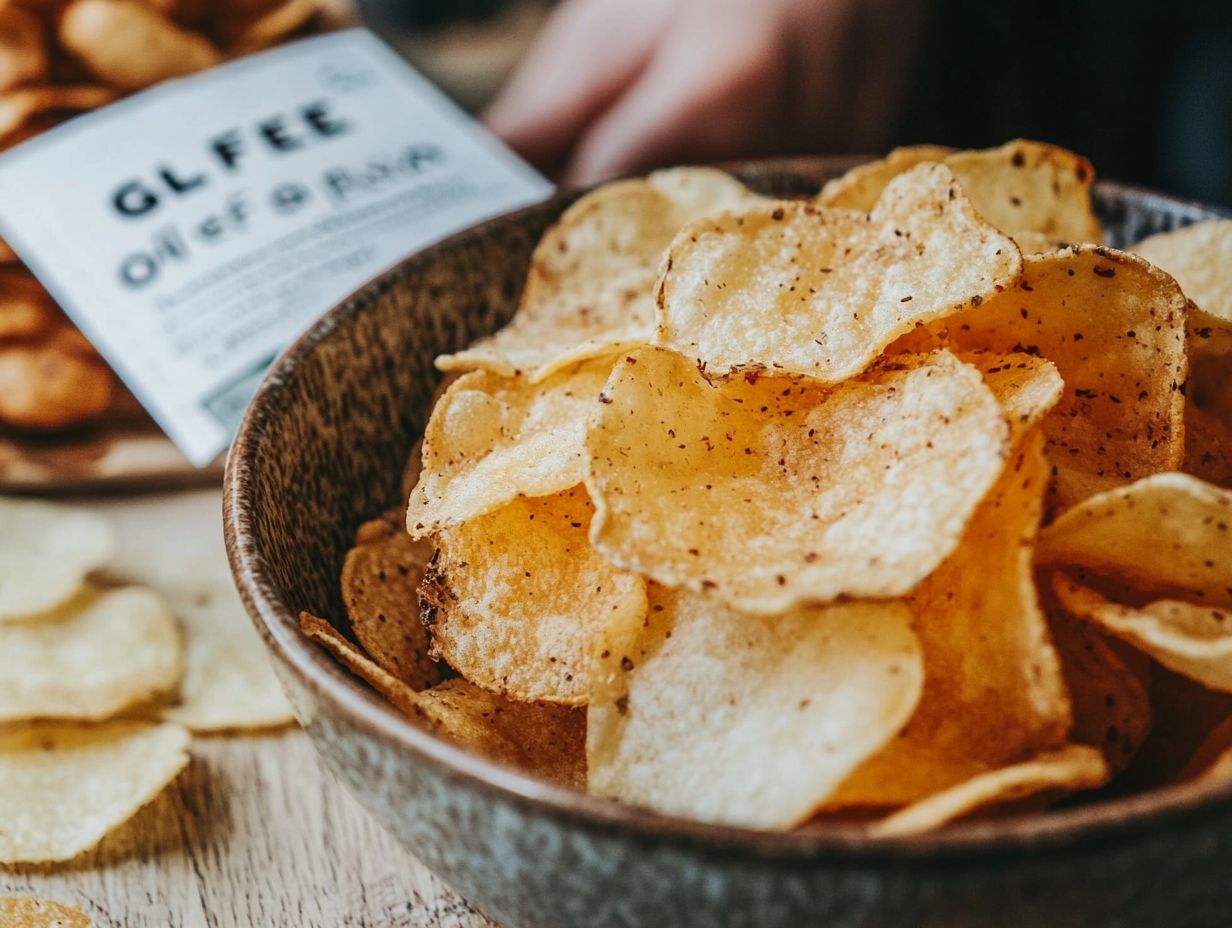
Not all potato chips are gluten-free, so it’s important to check the label for ingredients like wheat, barley, and rye to avoid consuming gluten on a gluten-free diet.
There are alternatives to regular potato chips that are gluten-free, such as baked potato chips, sweet potato chips, vegetable chips, lentil chips, and plantain chips.
While potato chips can be eaten in moderation on a gluten-free diet, be aware of the risks of cross-contamination. Opt for healthier homemade versions whenever possible.
What Is a Gluten-Free Diet?
A gluten-free diet is a regimen that excludes gluten, a protein found in wheat, barley, and rye. This is particularly essential for individuals with celiac disease, non-celiac gluten sensitivity, or a wheat allergy.
By following this dietary approach, you can effectively manage symptoms associated with these conditions while promoting your overall health and well-being. As awareness of gluten-related disorders continues to grow, many people are choosing to adopt gluten-free lifestyles, even without a medical necessity, believing it enhances their diet.
Understanding the implications and health benefits of a gluten-free diet is crucial if you’re considering making this change.
What Are the Foods to Avoid on a Gluten-Free Diet?
When following a gluten-free diet, steer clear of foods that contain gluten and any ingredients derived from it. These can provoke adverse reactions in individuals with celiac disease or gluten sensitivity.
Watch out for common culprits such as wheat, barley, and rye. Products made from these grains, including bread, pasta, and many processed foods, must be avoided.
Be cautious with oats, unless they are specifically labeled gluten-free. Cross-contamination during processing can be a sneaky culprit. Many baked goods, cereals, sauces, and certain beverages like beer often contain gluten as well.
Consuming gluten-laden foods can cause discomfort. Common symptoms include bloating, diarrhea, and fatigue, which can significantly impact your quality of life.
To stay safe and still enjoy a diverse diet, consider incorporating alternative grains like quinoa and rice. You can also explore gluten-free flours made from almonds and coconuts.
For additional support, dedicated gluten-free cookbooks and support groups offer invaluable guidance, tips, and recipe ideas to help you navigate your gluten-free journey with ease.
Are Potato Chips Gluten-Free?
Potato chips can indeed be gluten-free, but the key lies in the brand and the specific ingredients utilized in their production. Many reputable brands, such as Frito Lay and Lays, provide gluten-free options that proudly feature a gluten-free label, ensuring you can enjoy your snacks with confidence.
Be mindful of potential cross-contamination during the manufacturing process, which could present risks for individuals with celiac disease or severe gluten sensitivity. Always take a moment to review the allergen information and ingredients list before indulging in these delightful salty treats.
What Ingredients Should I Look Out for in Potato Chips?
When selecting potato chips, it’s crucial for you to carefully examine the ingredients list for any gluten-containing items and harmful additives, especially if you’re committed to a gluten-free diet. Be vigilant about common ingredients that might pose risks, such as certain seasonings that could sneak in gluten or cross-contaminated vegetable oil used during frying.
Beyond seasonings, you should also watch out for additives like malt vinegar or flavor enhancers, which may harbor gluten. As you seek out safer options, gluten-free certifications and labels will become your trusted allies, indicating that a product adheres to stringent gluten content standards.
Some brands opt for alternative ingredients like corn or different starches, making their products suitable for those avoiding gluten. Brands that practice dedicated gluten-free processing offer an added layer of assurance, minimizing the risk of cross-contamination.
Always remember to read the labels thoroughly to ensure you’re making informed choices that align with your dietary needs.
What Are the Alternatives to Regular Potato Chips on a Gluten-Free Diet?
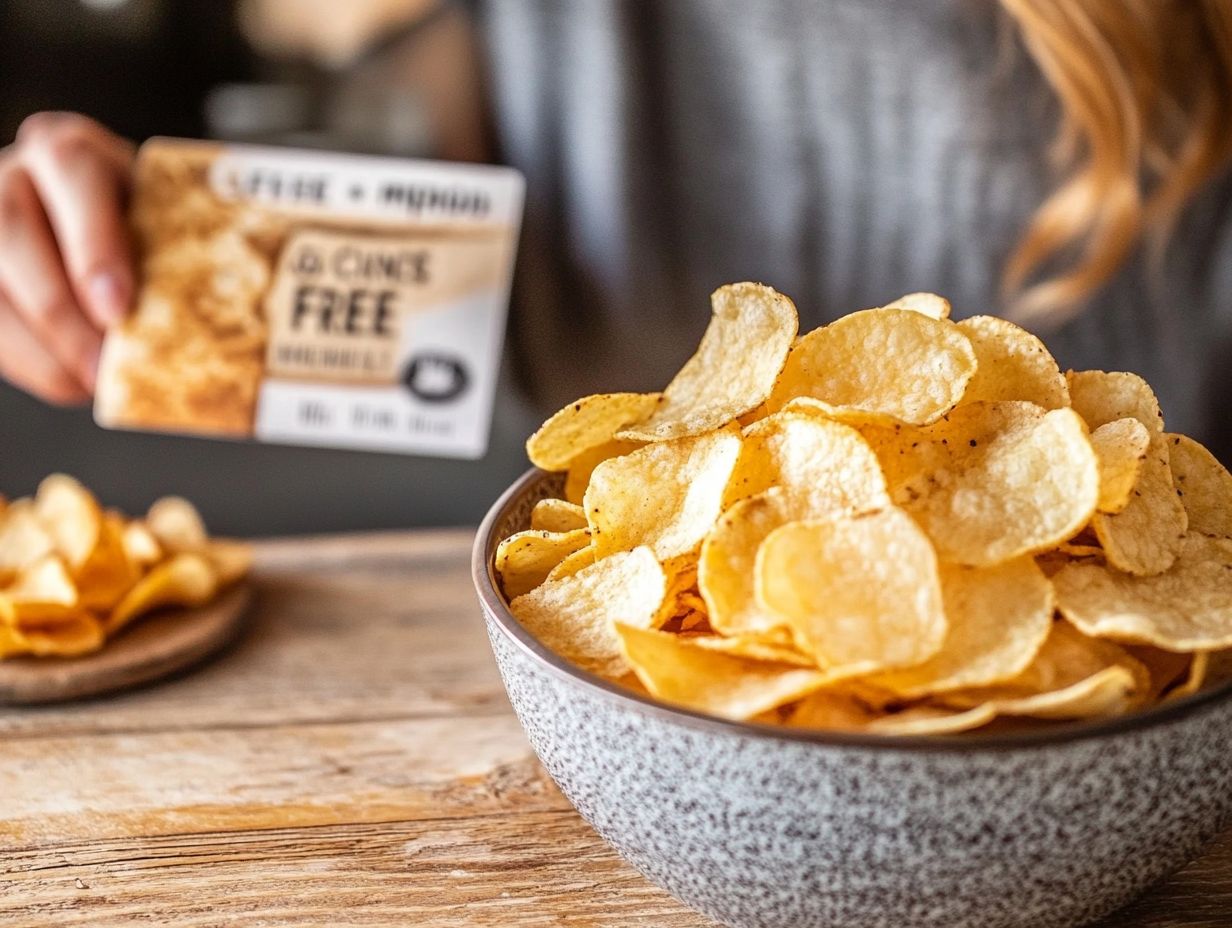
If you re following a gluten-free diet, you ll be thrilled to find a range of delightful alternatives to traditional potato chips that can satisfy your cravings while staying true to your dietary needs.
Consider options such as:
- Baked potato chips
- Sweet potato chips
- Vegetable chips
- Lentil chips
- Plantain chips
These choices not only meet gluten-free standards but often come with added health benefits, making them an exceptional addition to a nutritious diet.
1. Baked Potato Chips
Baked potato chips stand out as a popular gluten-free snack option, offering you a healthier alternative to traditional fried versions. They typically contain less fat and fewer calories while still providing that satisfying crunch and robust flavor you crave. This makes them an enticing choice for anyone looking to maintain a balanced diet without compromising on taste.
Baked chips do not come drenched in oil and can leave you feeling weighed down by greasiness. Instead, they are crafted through air-drying or hot air circulation methods, achieving that delightful crunch without piling on the extra calories.
Many brands, such as Kettle Brand and Cape Cod, present baked varieties that boast an impressive range of flavors from classic sea salt to zesty barbecue. There’s something for every palate! Plus, several brands go the extra mile to guarantee that their baked chips are free from gluten-containing ingredients, making them a suitable snack for those who are gluten-sensitive.
2. Sweet Potato Chips
Sweet potato chips present an enticing gluten-free alternative, celebrated for their natural sweetness and vibrant hue. They can effortlessly elevate your salty snack routine while packing in additional nutrients and fiber.
When compared to traditional potato chips, sweet potato chips often provide higher levels of vitamins A and C and feature a lower glycemic index, which is a measure of how quickly foods raise blood sugar. This makes them a smarter choice for those who are mindful of their blood sugar levels. Their fiber content not only supports your digestive health but also tends to be less processed, particularly when you make them at home.
Consider these popular preparation methods:
- Baking them with a drizzle of olive oil and a sprinkle of sea salt keeps them lower in fat.
- Air-frying achieves a satisfyingly crispy texture.
If you prefer store-bought options, brands like Terra and Late July come highly recommended for their commitment to wholesome ingredients. Indulging in sweet potato chips could be your delicious, health-conscious upgrade to snacking.
3. Vegetable Chips
Vegetable chips are an exceptional gluten-free snack that brings a vibrant variety of flavors and textures to your palate. Crafted from an array of vegetables like kale, beets, and zucchini, these chips cater to your health-conscious desires and provide a nutritious alternative to traditional potato chips.
They offer a delightful crunch, with unique flavors that venture far beyond the ordinary. Imagine flavors like tangy vinegar and sea salt, spicy chili lime, and sweet cinnamon each bite is an adventure for your taste buds.
Packed with vitamins and minerals, vegetable chips often boast higher fiber content than their potato counterparts, making them a smart addition to your diet.
For those embracing a gluten-free lifestyle, these chips deliver satisfaction without compromising on taste or health. With a range of options available to suit every preference, it s no wonder that so many are making the switch from classic potato chips to this modern snack alternative.
4. Lentil Chips
Lentil chips present a protein-packed, gluten-free option that you won t be able to resist! Crafted primarily from lentil flour, these snacks offer a delightful crunch and a unique flavor that distinguishes them from standard potato chips, making them a go-to choice for health enthusiasts.
Not only do these delectable treats satisfy your cravings, but they also serve as a rich source of fiber, essential for maintaining digestive health and fostering a sense of fullness. You’ll appreciate the diverse range of flavors available, from classic sea salt to smoky barbecue and zesty nacho, ensuring there’s a taste to suit every palate.
With their impressive nutritional benefits, lentil chips stand out as a smart alternative for anyone following a gluten-free diet. They allow you to indulge without sacrificing your health goals. Whether you enjoy them solo or paired with your favorite dips, lentil chips are a trendy option that seamlessly aligns with modern dietary preferences. Try lentil chips today and discover a snack that s both healthy and delicious!
5. Plantain Chips
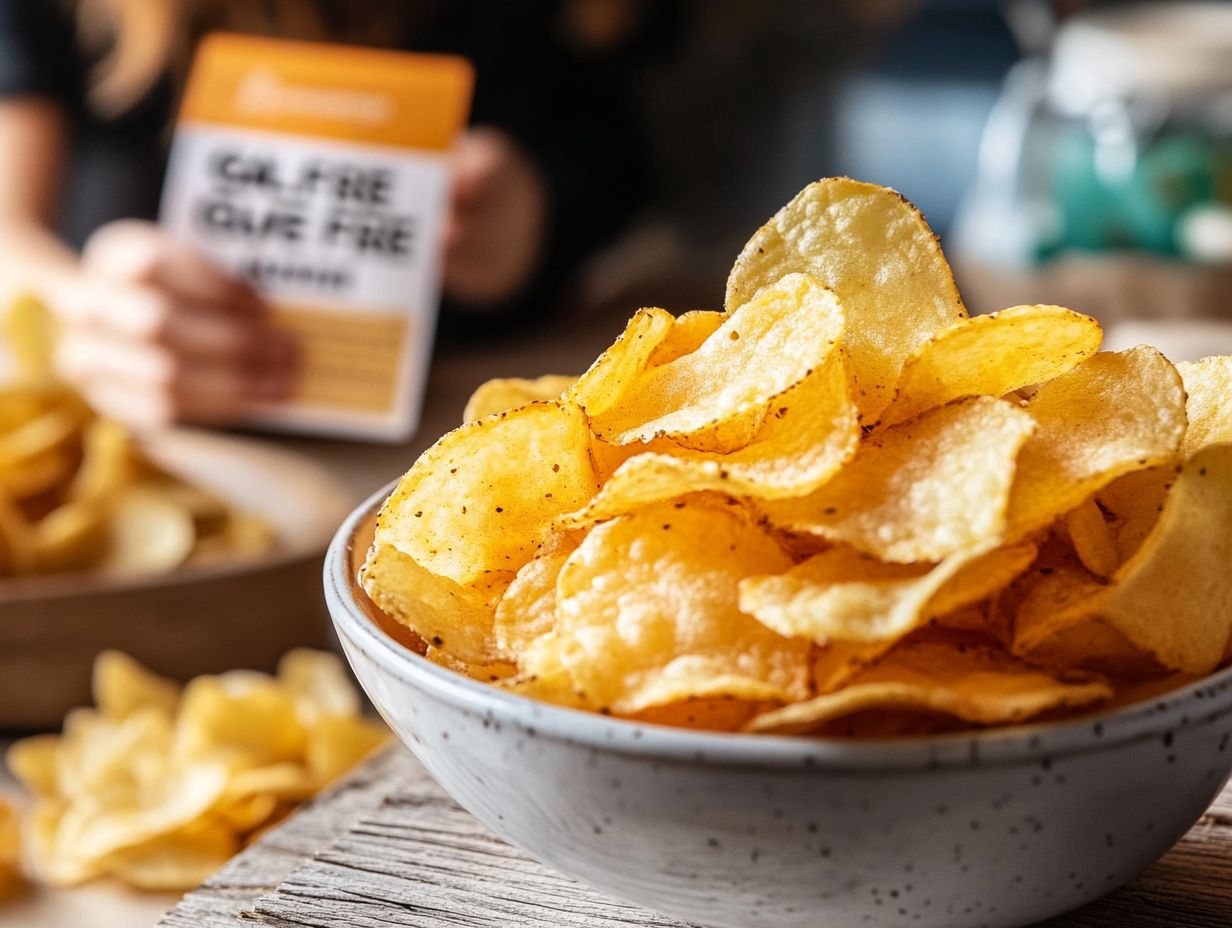
Plantain chips offer you a distinct gluten-free snacking experience, crafted from either ripe or green plantains. Their sweet or savory crunch makes them an exceptional choice for anyone in search of flavorful alternatives to traditional potato snacks.
In contrast to ordinary potato chips, typically made from starchy potatoes and often deep-fried, plantain chips are prepared by slicing the plantains and frying or baking them to enhance their unique flavor. The taste profiles are impressively diverse; while potato chips tend to lean towards salty or occasionally cheesy, plantain chips can surprise you with their delightful sweetness or saltiness, showcasing the plantain’s inherent sugars and earthy undertones.
From a nutritional standpoint, plantains outshine standard potatoes by offering more fiber and higher levels of vitamins A and C, making them an ideal fit for a gluten-free lifestyle. Plus, they deliver a satisfying crunch that appeals to health-conscious snackers.
Whether you enjoy them solo or paired with your favorite dips, plantain chips effortlessly elevate any diet.
Can I Eat Potato Chips on a Gluten-Free Diet in Moderation?
Enjoying potato chips while following a gluten-free diet can certainly be permissible, particularly if you choose gluten-free options that align with your dietary needs.
However, it’s essential to evaluate their nutritional value and ensure they fit within the broader context of a balanced and healthy diet. Moderation is key, allowing you to indulge without compromising your commitment to health.
What Are the Risks of Eating Potato Chips on a Gluten-Free Diet?
While gluten-free potato chips may seem like a safe snack option, it s essential to be aware of the risks associated with cross-contamination during manufacturing. Cross-contamination happens when gluten from other products mixes with gluten-free items, posing a significant concern for individuals with celiac disease or gluten sensitivity.
Particularly worrisome are chips produced in facilities that also process gluten-containing products. This can result in trace amounts of gluten sneaking into the final product. For those with increased sensitivity, even the tiniest quantities can trigger unwanted reactions.
Choose brands that clearly label their products as gluten-free and ensure they follow strict safety protocols!
Don’t skip the ingredient list! It’s crucial for your safety. Read allergen warnings on the packaging carefully. By exercising caution and staying informed, you can enjoy your potato chips without the nagging worry of cross-contamination.
How Can I Make My Own Gluten-Free Potato Chips at Home?
Creating your own gluten-free potato chips at home is a rewarding endeavor! It gives you the power to take charge of the ingredients and seasonings, guaranteeing a delectable and healthful snack that perfectly aligns with your taste preferences and dietary requirements.
By using fresh potatoes or sweet potatoes, you have the opportunity to explore a spectrum of flavors. Experiment with an array of spices and cooking techniques, whether you choose to bake or fry.
What Ingredients Do I Need?
To create gluten-free potato chips, gather basic ingredients like fresh potatoes, vegetable oil for frying or baking, and a variety of seasonings to customize the flavor to your liking.
If you’re feeling adventurous, consider incorporating sweet potatoes for a delightful twist and a unique taste experience. For a healthier alternative, air-frying requires minimal oil, allowing you to indulge in that satisfying crunch without the guilt. Baking is another excellent option that keeps the chips light while still hitting the mark on texture.
In terms of seasonings, explore options like garlic powder, smoked paprika, or nutritional yeast to add depth of flavor without any gluten complications. For those who enjoy a bit of heat, a sprinkle of cayenne or chili powder can transform your chips into a spicy sensation.
Feel free to experiment with sea salt, various herbs, or even cheese alternatives to make each batch of chips distinctly delicious, catering to a wide array of palates.
What Is the Cooking Process?
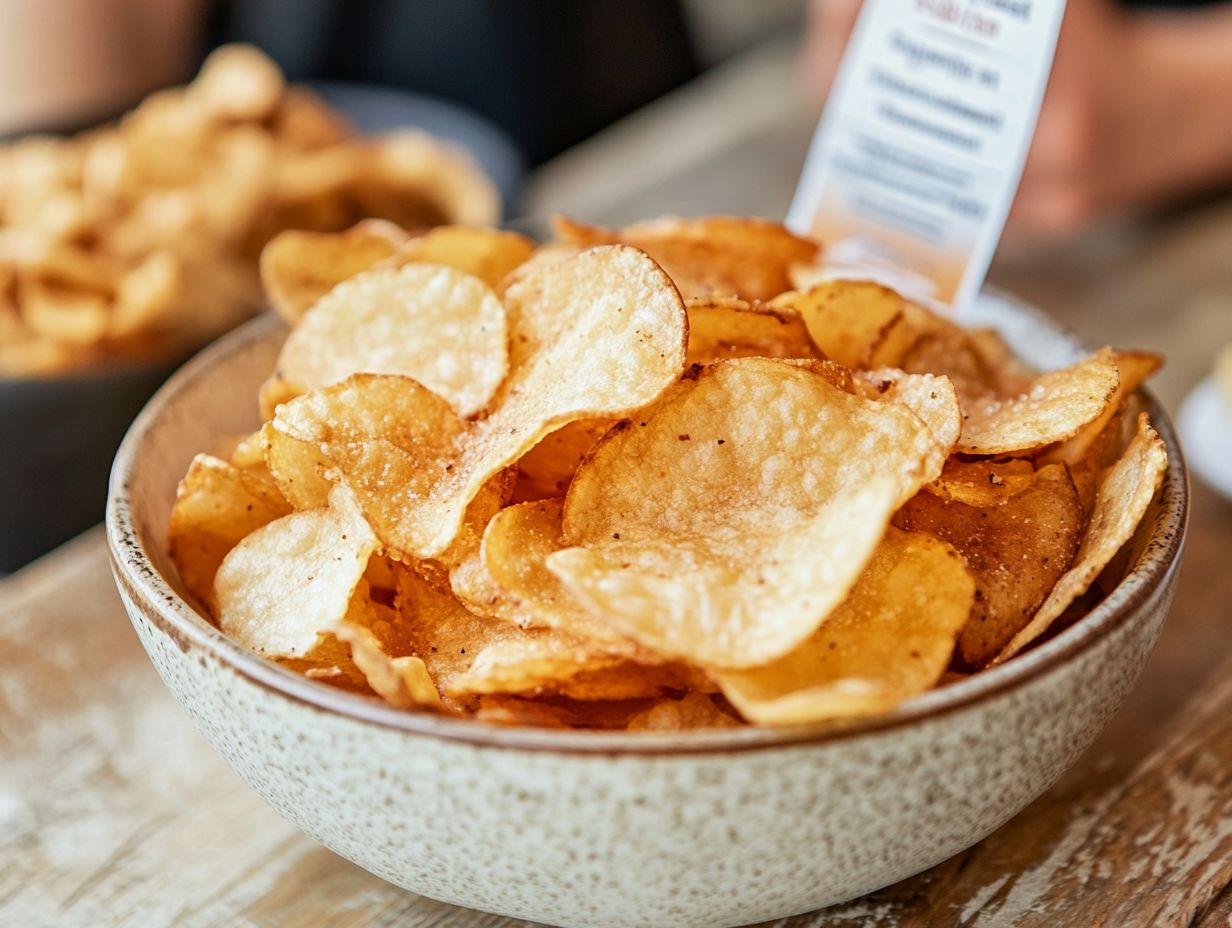
The process of making gluten-free potato chips can be remarkably simple, whether you opt to bake or fry them. Begin by thinly slicing the potatoes, soaking them in water, and then meticulously drying them before cooking to achieve that satisfying crunch. This step is crucial, as it releases the starch, ultimately resulting in crispier chips.
If you choose to bake, preheat your oven to 400 F (200 C). Spread the potato slices in a single layer on a parchment-lined baking sheet and drizzle them lightly with olive oil for an extra layer of flavor. Bake for 20-25 minutes, flipping them halfway through, until they reach a perfect golden brown.
If frying is more your style, heat the oil to 350 F (175 C) and cook the slices in small batches for 3-5 minutes just be sure to keep a watchful eye to prevent burning.
Making chips at home gives you greater control over the ingredients, allowing you to make healthier choices. Plus, it opens the door to experimenting with various seasonings, ensuring that each batch is tailored to your unique taste preferences.
Frequently Asked Questions
Can I Eat Potato Chips on a Gluten-Free Diet?
Yes, as long as the potato chips are labeled as “gluten-free” on the packaging.
Are all potato chips gluten-free?
No, not all potato chips are gluten-free. Some brands may use wheat flour or other gluten-containing ingredients in their seasoning or cooking process.
How can I tell if potato chips are gluten-free?
Look for packaging that specifically states “gluten-free” or “certified gluten-free.” You can also check the ingredients list for any gluten-containing ingredients.
Can I eat flavored potato chips on a gluten-free diet?
It depends on the flavoring used. Some flavored potato chips may contain gluten, so it is important to check the ingredients list or look for a “gluten-free” label.
Are there any alternative gluten-free snacks to potato chips?
Yes, there are many gluten-free snack options available. Some alternatives to potato chips include vegetable chips, rice cakes, and popcorn.
Can I eat potato chips if I have celiac disease?
If you have celiac disease, it is important to only consume potato chips that are labeled as “gluten-free” to avoid any potential cross-contamination. It is always best to consult with your doctor or a registered dietitian if you have any concerns or questions about your diet.




